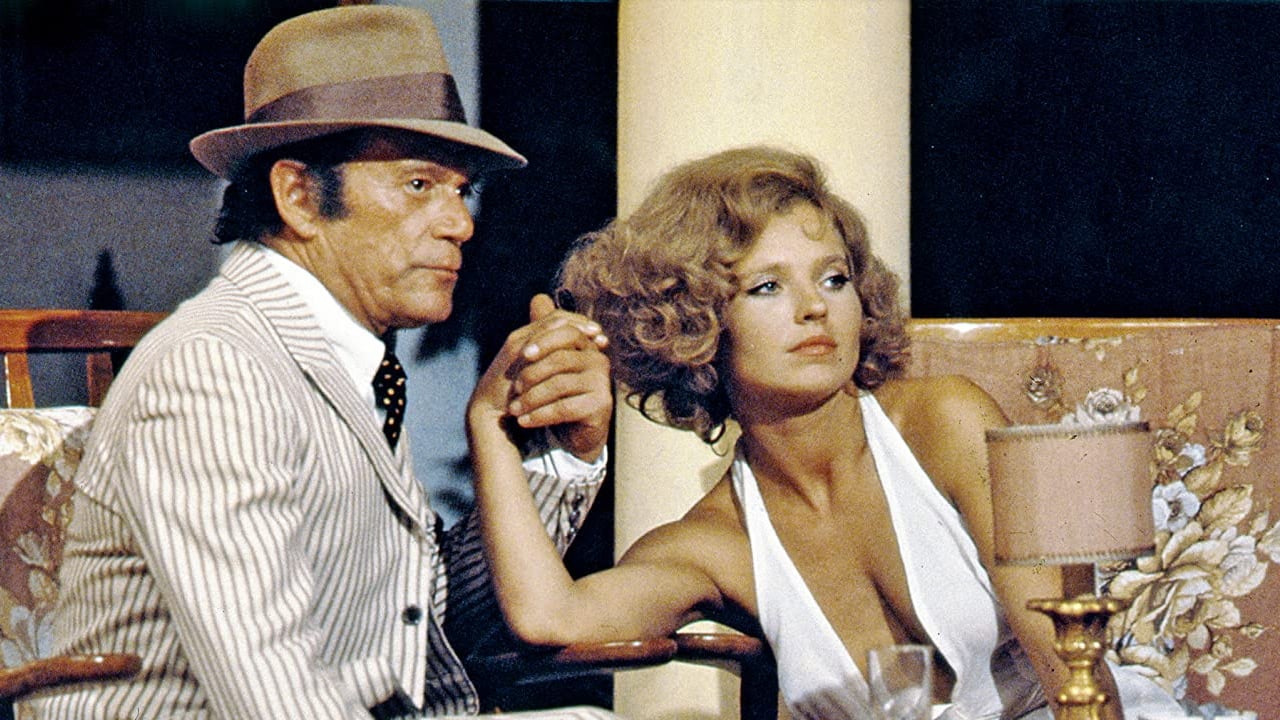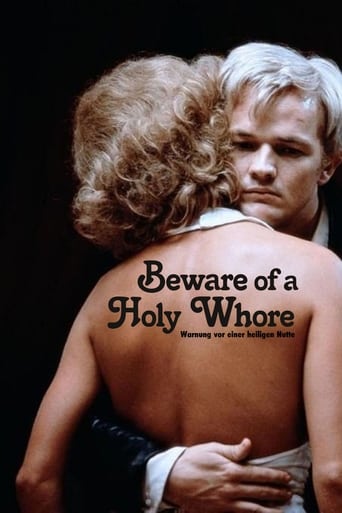Afouotos
Although it has its amusing moments, in eneral the plot does not convince.
Nicole
I enjoyed watching this film and would recommend other to give it a try , (as I am) but this movie, although enjoyable to watch due to the better than average acting fails to add anything new to its storyline that is all too familiar to these types of movies.
Jenni Devyn
Worth seeing just to witness how winsome it is.
Ore-Sama
The film's story can be summed up as a cast and crew being stuck making a film that seems like it will never get off the ground: whether it's getting the film stock they need or getting the director to do his job instead of finding some other reason he can't shoot right then. During that time, the crew find ways to amuse and busy themselves.This was a transitional period for Fassbinder: he was moving away from the abstract, visually interesting but ultimately empty Godard inspired works like "Love is Colder than Death" and "The American Soldier" and just starting to phase over to melodrama, where his great works reside. Thus this film falls somewhere between the two styles.With the exception of a couple of scenes, there is no music. The performances, for the most part, are very low key. Only Sacha, the producer, and the director express any flare. This in of itself can be alienating, especially for those accustomed to more mainstream comedies, but there's also the looseness of the writing. There's no real arc or build up to anything. Scenes simply happen. Characters A and B might be having a fling in one scene, but two scenes later it's A and C, and it's as if A and B were never together. We'll have a scene of the director stating definitively he can't finish the film, but goes on making the movie with no obvious explanation. Yet there will be other moments that ARE followed up on later in the movie, even if only for a scene. Scene order is some times completely random. One scene of the director screaming at his crew he doesn't want to be near them could've been placed anywhere in the movie.All of this together and it becomes easy to see why the movie is so polarizing: it is often emotionally flat, has a very slow pace(which is the opposite of what one expects from a comedy) and barely has a narrative. This is why you see reviews saying nothing happens, saying it's a waste of time or that it feels like improve.So then why is it loved by others? Speaking as someone who loves the movie, I can answer.First, the characters themselves. The director and producer are the highlights, but there's a wide cast of personalities and whether the film is going anywhere or not, it's a joy just to see all the various interactions between them. If you're willing to follow along and show patience for what's occurring, you'll grow to love watching these people, kind of like a family you wouldn't want to live in but watch from a distance. The unappreciated unit manager, the poor, abused translator, the often perplexed Eddie Constantine, they all bring something to the film and since there's such an abundance of them, none of them wear out their welcome.Secondly, the movie is funny. It's sense of humor is somewhat dry, partially thanks to the mostly flat delivery, but it's there. The highlights of course being the director himself, whether flaunting his pretentiousness or screaming at the screw for often inane and petty reasons, the movie's laughs are earned. The randomness of the scene order also plays a part of this. The topic of the scene can be humorous or heavy, but it's all played out in the same way.But above all else, even when it isn't funny, it's interesting. Whether just seeing what they'll do next or the ambient atmosphere, I never found myself bored with this movie. If you can get accustomed to it's style, it's a fascinating sit through.This is certainly a film that requires a bit of work on the viewer's part, but I think it is well worth it.
MisterWhiplash
It's amazing to see that Rainer Werner Fassbinder made this picture when he was just 26 (and, perhaps not too oddly enough due to his reputation, looks all of 41 as the producer Sascha) and it has the kind of sad insight that an older, more experienced director would have. But from everything I've read, he was already this experienced, for better or worse, as the director depicted in the film, Jeff (Lou Castel). Jeff is hot or cold, sometimes both, and can either be sullen or deep in thought or just going completely off on someone and throwing them off the set. In Beyond a Holy Whore he's shooting- or trying or not trying to shoot- some movie starring Eddie Constantine in a role that sickens the veteran French star, and most of the crew and women around him languish in a sea of distilled despair: will the movie actually get finished? Where's the money? Who's sleeping with who? What will be the consequences of this or that? In terms of the storytelling, I was thrown off at first by Beyond a Holy Whore. It's not really very uniformly put together, and makes 8 1/2 look about as lucid as a Hollywood Golden Age picture by comparison. It's not really dreamlike, but it's got a sad, perverse streak of rotten existentialism going on (or maybe what Fassbinder thinks it is). So, from time to time, it is a little choppy, as one scene goes into the next without much of a sense of where the story is. But after a while I got into the modus operandi; this is by design a story of this man, Jeff, and his producer, Sascha, along with various groupies, gay folk, disgruntled actors, going along with a flow that never seems to be taking any charge. What becomes clear, in segments that occasionally have comedy to them (I just started laughing at one bit where Jeff was losing it and crying hysterically while directing a scene) and sometimes have a lonesomeness as via the characters, is that film-making can be a rotten enterprise when the creative well runs dry.But it's not just about creativity or lack of inspiration for Fassbinder; it's also a kind of mood that he sets which is important, of going through a similar self-imposed brutality that the director wants depicted in the film within the film. As far as "director self-commentary" pictures go, it's not one of the best ever made. But it is an interesting picture all the same, one that grows on the viewer accepting of its loose form and sad notes - not to mention fine points of irony like the sweet Leonard Cohen songs playing over the decay at the bar.
ocaastro
This film is supposed to be about the frustrations of film making. It certainly frustrated me with its endless boredom. The setting is an attractive Spanish seacoast resort with his usual large cast. The script is very poorly written or maybe there was no script. Just all ad-lib.A far superior film about the frustrations of film making is Francois Truffaut's "Day For Night" made in 1973. It shows all the delays and how the cast can misbehave in an intriguing manner. It doesn't bore the viewer and you gain sympathy for the director who somehow must complete the film.
Mark (m_a_singer)
I'll accept the previous reviewer's comments that this was supposed to be a self- parody. If so, then this shows why one of the shortest books in the library is "500 Years of German Humor."I've loved most of Fassbinder's films, but this pretentious attrocity is an absolute void. Nothing happens, though some of the actors look like they think they should *think* that something is happening. Some have the grace to look embarrassed, but they may just have been stoned. Worse, it looks cheap - the framing is off on most of the shots (no, it's not an alienation effect - it's just sloppiness), and the print currently on video is terrible, though I doubt it looked much better in '71. Probably more was spent on glassware for the bar and cigarettes than on anything else.The only positive things I can say are that the opening credits are nice, and that if you need a reminder of how awful early 70s clothes were, this is it.You can have more fun digging wax out of your ears than you can watching this movie.

